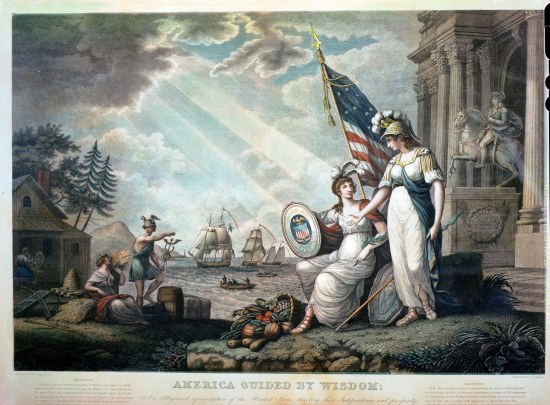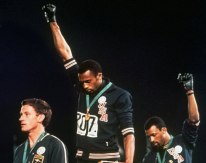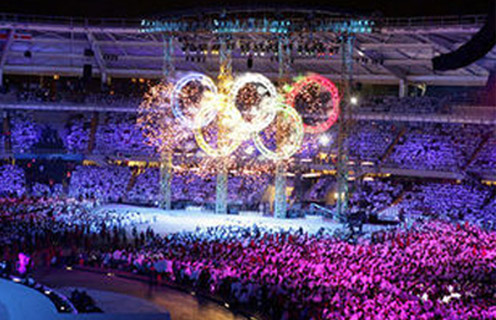The world is 80 days away from the 2016 Olympic games and the coverage is predictably bleak. The issues for Rio are mounting: Brazil’s political turmoil, the threat of the Zika virus, recent breaks in the ongoing doping scandal, sewage in the water, and perennial concerns on the benefits of hosing an Olympics. All of the issues beg the question: are the Olympics even worth it?
This question is not new. The past Olympics in Sochi and London had similar issues prior to hosting the games, and in the aftermath of their games, the cities may have not gained what was promised. But the coverage over the Olympics prior to the games reads like a study in alarmist journalism. Yes, the issues are concerning. Yes, journalists should cover the issues that are threatening peoples lives and economies. But the forgotten story is the benefits of the Olympics, especially exigent in the current culture of news and politics in the United States. Here’s why the Olympics are still worth it.
It beats American exceptionalism at its own game.

2016 America is again suffering from its chronic sickness of American exceptionalism. There’s a clear implication in this election season that America must return to a time when it protected it values by exerting complete military power and fearing the immigrant. Re: Make America Great Again. This push is fueled by the belief that the United States is a city on a hill, a sacred land ordained by a Christian God to succeed in all its endeavors. American exceptionalism threatens to isolate the United States not just from the rest of the world but also from the progress a changing world requires.
The modern Olympic games beat this belief while feeding into it. During the Olympics, we watch our athletes compete against other athletes from all over the world. We root for them to win over these other athletes, but a funny thing happens as we watch: we are forced to pay attention to other countries.
It’s easy as an American to ignore news that does not affect us. We rarely care about other countries and often allow this ignorance to impact our policies concerning other countries, nationalities, and races. The Olympics encourage nationalism while enforcing the idea that all countries deserve visibility on a world stage. There are countries in the Olympics that most of us have never heard of, and yet there they are on the medal stand, playing their very real national anthem.
Outside of the World Cup (which we are notoriously bad at watching), no other event forces Americans to consider the humanity of other nations. In 2016, that’s a sorely needed consideration.
Athletics is a place to fight for equality.
Though the realm of professional athletics is rife with racism, sexism, etc, there is a unifying factor of athleticism. The standards for events are clearly set and many marginalized athletes succeed in reaching and exceeding them. (This, of course, assumes the caveat of understanding the way privilege plays into achievement, the complicated history of the slave trade and athleticism, and generally the way the world works.) The stage of athletic competition mostly requires one be able to compete.
The irony of the modern Olympic games has always been that it brings athletes together despite race, gender, and class. People of color have been making the white people in power uncomfortable at the Olympic games for as long as they have been allowed to compete in them. While the appreciation of the black body in sport is incredibly problematic, the Olympics also reach less-tainted audiences of the youth who then aspire to be like those athletes (sometimes) regardless of race.
Many Olympians have used the venue to bring awareness to the marginalized and actively create positive, emotive symbols for the cause. Under the momentary protection of the

eyes of the world, John Carlos and Tommie Smith became symbols of the fight for civil rights in the United States. The 2012 Sochi games highlighted the “schizophrenic” state of the rights of LGBT people around the world. This year Ibtihaj

Muhammad will be the first Muslim woman to compete for the U.S., challenging beliefs on Muslims, the hijab, and the sport of fencing.
The fight for equal rights across issues typically takes place in the streets of hometowns, but during the games, these issues cannot be dismissed as domestic but are forced to the audience of the world.
“Olympic moments” are an antidote to the news.

It is clear that the news takes on the most dismal and disheartening stories to highlight. In the 24-hour news cycle, the emphasis on tragedy is palpable and problematic. The best thing about the Olympic games is that it gives the world something positive to talk about.
The feats of the athletes, the incredible strength and skill, remind us that we are all human. In these moments, we see athletes hugging their families, celebrating their country, and connecting with their team. These superhumans display the spectrum of human emotion and give the audience hope for a world that can do more than take just a temporary pause on wars to participate. It gives the audience hope that the world is not as malicious and scary and the media makes you think. It gives the audience hope that the ideals of the Olympics can translate to more than just the games.
The Olympics will always be filled with political, economic, and social turmoil and we must figure out how to lessen the games’ ill effects. However, if we were to get rid of the Olympics, we would be left with a little less peace, prosperity, and potential.
